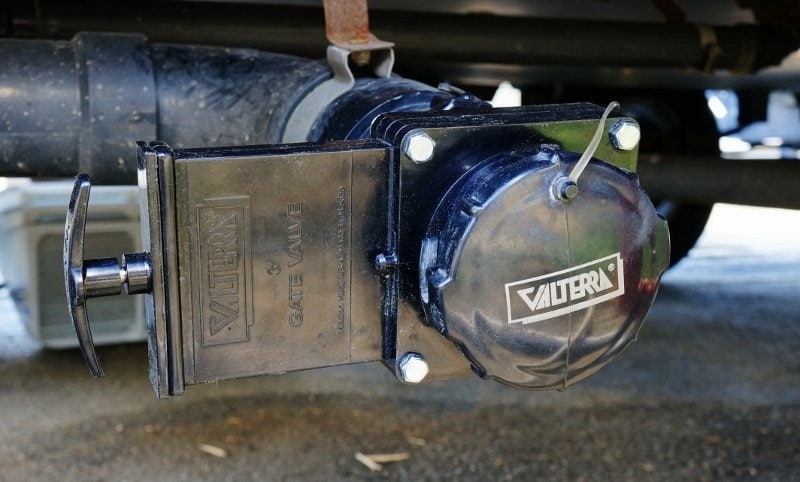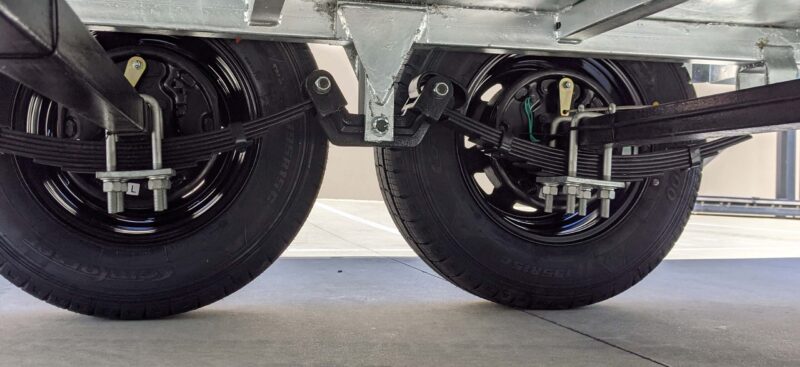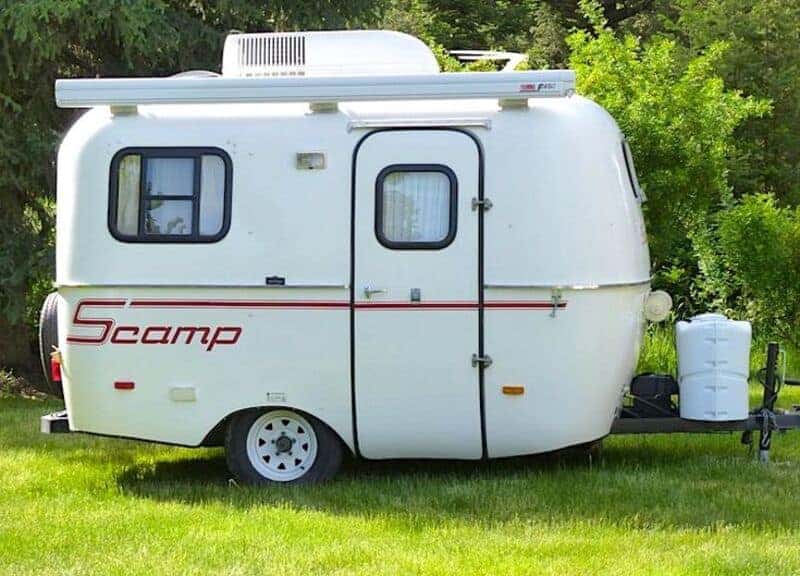One question that comes up in our private Facebook group called RV Camping for Newbies is: Is it legal to dump RV grey water tanks on the ground?
Based on comments in the group, most folks think it is illegal and some others think it is totally legal. And there are few people who don’t care and feel they can dump their RV grey tank anywhere they please.
As RV owners, we know that dumping water storage tanks is an important part of maintaining our home on wheels. When we are at a location that has full hook-ups this is easy.
But if boondocking or camping off the grid, you will have to dump your grey water on the ground or find a dump station for your RV grey water and black water tanks.
This can be very inconvenient, and you may have wondered if you could just dump your tanks on the ground and drive away. As an RV owner, you should never dump your black tank on the ground. The RV grey water tank, however, is a bit more confusing.
In this article, we will take you through the legalities of dumping your RV grey water on the ground. We will also take a look at why this practice, even when legal, might not be such a great idea.
What’s The Difference Between RV Grey Water And Black Water?
Most RVs and travel trailers have two waste water tanks, a black water tank, and a grey water tank. The black water contains human waste and toilet paper. This is the water that comes from your RV toilets. Black water is stored in the black water tank, which is usually separate from your grey water tank.
RV grey water is any water that comes from your RV sinks and showers. While it does not contain urine or feces, it can still have plenty of bacteria.
Grey water will also have things like food particles, soap, toothpaste, and cleaning products. Your RV will likely have a separate grey water tank for holding water from sinks and showers.
Both RV grey water and black water have a foul smell and contain things that can be harmful to humans, wildlife, and the environment. Although grey water could be considered less harmful than black water, it is still by no means clean.
Is It Legal To Dump RV Grey Water On The Ground?
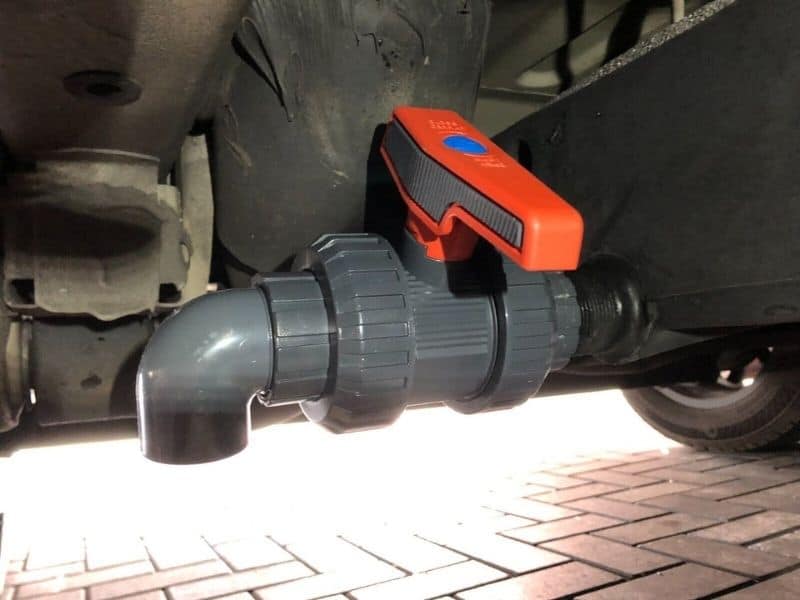
This is a tricky question to answer. The answer can be yes, but depending on where you are, the answer can also be no. Let’s start with the etiquette side of things.
Even if you are somewhere where it is legal to dump your RV grey water on the ground, it is really frowned upon. Not to mention, kind of gross. In general, it is just not a polite way to manage your grey water tanks.
There are places where you can legally dump RV grey water on the ground. However, you need to know the laws and regulations of the particular places where you are traveling. In RV parks, no matter the state, dumping your grey water tank is always against the rules.
Most communities and states have laws that limit where you can legally dump your RV grey water tank. With more and more concern about protecting the environment and waterways, many communities are making it illegal to dump your grey water tank on the ground.
If you are unsure what the local laws and regulations are, make sure you do your research before emptying your grey water tank on the ground. In many cases, if you are on your own rural property dumping grey water may be okay.
Even in these cases, you should be aware of and considerate of waterways, wildlife, and the flora and fauna in the area.
How To Legally Dispose Of RV Grey Water
If you have questions about whether it is legal to dump your RV grey water tank on the ground, the best thing to do is to not dump your grey water. It’s not worth the risk of dumping your tank illegally.
So, if you are unsure, don’t dump your tanks until you can access one of the two legal options for dumping your grey water tank.
The first legal dumping option is to hold your tank until you arrive at a campground, assuming you have been boondocking somewhere like a Harvest Hosts location or BLM land. This is the ideal situation, and it is included in the cost of your stay.
While you are staying at a campground with sewer connections, you will not be filling your grey water tank because, in most cases, it is okay to leave your grey tank open while you have full hookups.
The second legal option is to find a dump station. Many RV parks or campgrounds have dump stations that you can use for a minimal cost.
If this is not a possibility, many municipal wastewater plants have dump stations as well. Some BassPro and Cabella’s stores also have RV dump stations that can be used for a small fee.
There is a third option, which is sometimes legal, that Mike and Susan from RVBlogger discuss in their YouTube video below. In this video, they answer the question: Can I dump my grey and black water tanks at home? Check out their video below for the details.
How Often Do RV Grey Water Tanks Need To Be Emptied?
If you are a new RV owner, you probably have questions about how often you need to empty your water tanks. Generally, you will want to dump your grey water tank as frequently as possible. This keeps the weight of your RV balanced and reduces the potential for odors.
However, there are some other considerations when it comes to dumping your grey water tanks. If you are a single person with a larger RV, you will not need to dump your grey water tank nearly as often as a family of four in the same size RV.
If you have a small RV, even if you are traveling alone, you will need to dump your tanks more often. These smaller RVs have smaller tanks, so they need to be dumped more frequently.
What’s In Your RV Grey Water?
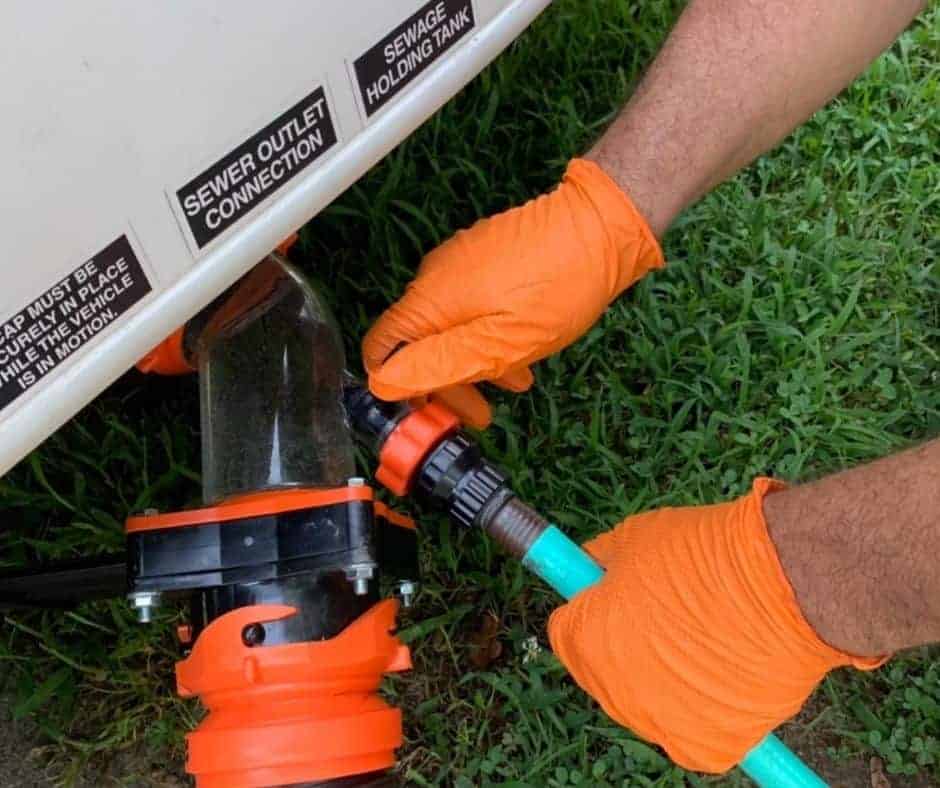
Your grey water tank is not just filled with water. It’s the extra stuff that is in your grey water tank that you need to be concerned about. Sure, grey water is less gross than black water but it does have stuff that can be bad for the environment.
Your grey water tank will have things like food particles and grease from washing your dishes. It will also have soap, shaving cream, cleaning products, cosmetics, and toothpaste in the mix.
In galley tanks, which are grey tanks dedicated to the kitchen of an RV, mold can form inside the tank.
These waste products can be bad for the environment as well as animals that may be attracted to the smell of the waste from your grey water tank.
Why Does RV Grey Water Smell Bad?
You may notice that your grey water has an odor. It may not be as offensive as the odor from your black water tank, but it can be strong. This odor is caused by bacteria growing in the stagnant water of the tank. The food, grease, and cleaning products also add to the smell.
Many RV owners do not realize that there are bacteria in their grey water tank. Food particles and dirty shower water can both contain bacteria.
This bacteria produces odors and can also work to break down food particles in the tank. This process can result in odors that can become offensive in your RV if you do not empty the grey water tank frequently.
Is RV Grey Water Harmful To Animals?
Speaking of animals, RV grey water is not necessarily a great thing for wildlife or pets. The food remnants from your grey water tank, although inviting to animals, are not safe.
Dumping your grey water tank on the ground will surely attract animals. Depending on your location this might mean animal visitors ranging from mice and insects to bears!
Many people do not realize that chemicals from soaps, detergents, or cosmetics can be harmful to animals. We use these products because they do a good job of washing our dishes or cleaning our hair and body.
We wouldn’t want to eat these products, even those that are considered natural or organic. The same is true for animals. Chemicals may have mild impacts on their systems and, if ingested, can be very harmful.
Also, these same chemicals and food products can also be harmful to lakes, rivers, and streams. Soap products contain chemicals that cause foaming or can encourage the growth of algae. This can be harmful to fish, frogs, turtles, and other aquatic animals.
If you are concerned about protecting our environment and planet, an easy thing to do is to dump your RV grey water at proper dumping locations.
3 Tips For Using Less RV Grey Water
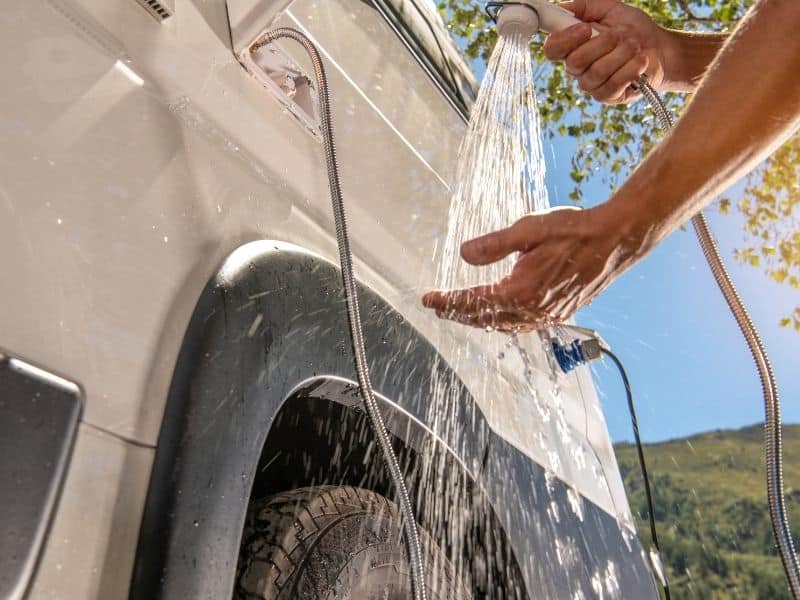
Lots of us are used to using water conservation practices in our homes. Many of these practices can be used in our RV as well. Here are three ways that you can reduce the amount of grey water you make in your RV.
1. Take shorter showers
We all have learned to take short showers when we’re traveling, particularly if we are camping without full hook-ups. Showers are where most of the grey water from your RV comes from. Reducing the length of your shower is the easiest way to make less grey water.
Another way to reduce grey water from showering is to turn off the water while you wash your hair or soap up your body. This is known as a military or navy shower. Then turn on the water when you are ready to rinse.
Water-saving RV shower heads are a great investment that makes reducing grey water easy.
2. Don’t let the water run when washing dishes and brushing your teeth
This is a practice that many of us are used to from being water-conservative when we are not traveling in our RV.
When you are brushing your teeth, washing your face, or washing dishes, turn off the water until you need to rinse. Letting the water run while doing these tasks will just add to the quantity of grey water you have to deal with.
3. Fix any leaks or dripping faucets
Leaks can be a huge waste of water. Leaky faucets consume stored water and fill your RV grey water tank with no purpose.
If you find that you have faucets that leak attend to them right away. An easy way to check for leaks is to use your RV’s water pump.
Switch over to the 12-volt water pump and with the faucets all closed listen for the pump. A pump that cycles with the faucets closed is often the result of a leak.
Final Thoughts About Dumping RV Grey Water On The Ground
While dumping your RV grey water on the ground may not be an illegal practice, it is not a great way to manage your RV waste.
There may be times when you will need to dump some or all of your grey water tank on the ground, but these instances should be infrequent and only when it is an emergency or necessary for safety.
If you can, the best practice is to use dump stations or campground hook-ups to manage your RV grey water tank.
When you do have to consider dumping your grey water tank on the ground, make sure that you know local or state laws and regulations so that you can avoid a ticket or fine.
Related Reading:
– How To Use An RV Sewer Donut And What It Looks Like
– 25 Campground Rules Everyone Should Follow
– Do You Really Have To Use RV Toilet Paper?
– 11 Proven Ways To Eliminate RV Toilet Smells
About the Author:
Jason Gass is a full-time freelance writer and part-time RVer whose goal is to share great stories around a campfire with good friends.
When he’s not working, he spends most of his time camping, searching for the best breweries, and road-tripping in his teardrop trailer with his wife, daughter, and two dogs.


